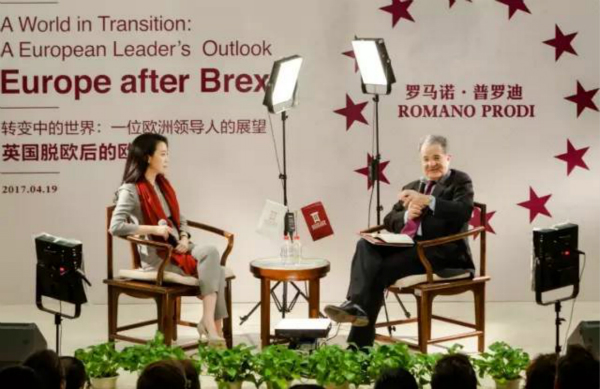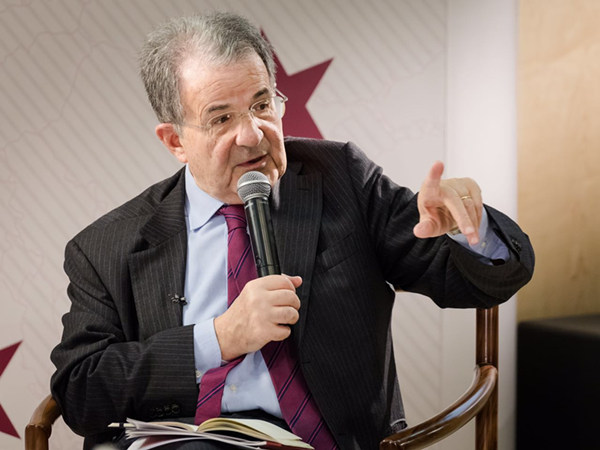By David Hongler (2016 Yenching Scholar)
When a political figure as well known and experienced as Romano Prodi delivers a lecture, expectations are bound to be high. This was the case too on Wednesday morning, when the Yenching Academy had the pleasure and honour to welcome this important figure of European politics for a conversation with both Yenching Scholars and the wider PKU community on the topic of “Europe after Brexit”. Yenching Scholar Alessio Wei Chen (Italy, London School of Economics), Professor Zhang Fan of the History Department of Peking University, and Dean Yuan Ming of Yenching Academy delivered brief welcoming remarks. They expressed their delight at welcoming such a distinguished speaker, and highlighted the importance of such events for the fostering of mutual understanding between China and Europe. The lecture formed part of the wider lecture series “A World in Transition: A European Leader's Outlook”, and Professor Prodi was invited by the Peking University Global Fellowship program.

Considering his background in European politics, it was fitting that Professor Prodi came to the Academy to discuss the imminent reshuffle of the European political arrangement brought about by the United Kingdom's decision to leave the Union by 2019. Unsurprisingly, he considered it to be a very regrettable development. Indeed, he went so far as to describe it as a “suicide” by the British. He argued that the UK was not the disadvantaged victim of European bureaucracy, as Brexit proponents and major news outlets had often times portrayed it during the run-up to the referendum. Instead, Professor Prodi had - when he became President of the European Commission in 1999 - found himself at the helm of a European Union on which Britain exerted the most influence. He said that for him this was rather surprising, considering the popular narrative of France and especially Germany being the dominant states within the Union at the time. According to Professor Prodi, the UK held two decisive advantages: Firstly, he emphasised the unified manner in which British officials within the European Institutions defended British interests, with other member states' representatives often split along the lines of partisan politics rather than national interests. Secondly, he underlined the language advantage. The widespread usage of English for most of the communications and negotiations within the European institutions gave the UK a decisive edge in the decision-making processes. British influence began to wane only after the government had announced its intention to call a referendum on the British Union membership, which undermined its credibility among the smaller member states.
Professor Prodi further addressed the role and influence of the media in bringing about Brexit. He noted that the depiction of the European Union and its policies in major UK media had been negative for many years. From his perspective, it became extraordinarily hard to convince people of the benefits associated with a membership. On a more general note, Professor Prodi warned against the destructive potential of one-sided and polemic media interventions in Western democracies.
Apart from the many and pressing issues surrounding the UK's exit from the Union, Professor Prodi also discussed major European decisions over which he had direct influence during his tenure as President of the European Commission. It had been under his leadership, after all, that the Commission oversaw two of the most significant decisions in the history of the European Union. He guided both the formal introduction of the single currency in 2003, as well as the fifth expansion of the European Union in 2004, the so-called «Eastern enlargement».
Today, both of these decisions are discussed controversially. It was enlightening to hear Professor Prodi's insights into the political and institutional processes, by which both of these major changes came about. He emphasised the meticulous, at times tedious, process preceding these two institutional developments, refuting the idea that any of these decisions was made rashly and without a comprehensive analysis. He also stressed the difficulty of finding common ground among all the diverging national interests. For him, however, the opportunity for further integration on the European continent during his tenure was historic, and could quite simply not be allowed to pass: thetrain of history had to be taken.

Over the course of the lecture, Professor Prodi often referred back to the history and origin of the European Union as an essential peace project in a Europe ravaged by two World Wars. He cited a conversation with Helmut Kohl, the former German Chancellor, who had mentioned the death of his brother during the Second World War as a reason for further European integration. Professor Prodi cautioned against the lack of awareness and memory of the war among the young generation of Europeans. Young people today perceived the European Union simply as an instrument to improve their economic well-being, and had largely forgotten what a fundamental role the Union played in creating the longest period of peace in Western European history.
Professor Prodi touched upon many more topics over the course of his lecture and continued to share his insights and thoughtful remarks during the subsequent lunch with Yenching Academy's Associate Dean John Holden and a number of Yenching Scholars, who were given the opportunity to attend. He further addressed a number of topics, such as the refugee crisis, American interventionism and European foreign policy around the Mediterranean and in Eastern Europe, as well as the prospering relationship between Europe and China. Time and again, he understood to illustrate historical, economical and political subjects using rich and personal anecdotes. Professor Prodi's immense first-hand experience, his academic and practical understanding of Europe, and also his charming manner and intellectual awareness, left a lasting impression on the attendees. At one point during his lecture, he described Europe as an “economic giant, but a political dwarf”. It is safe to say that with his life's work for Europe, Romano Prodi is nothing less than a giant of European politics. Welcoming him at the Yenching Academy was a truly inspiring experience.
